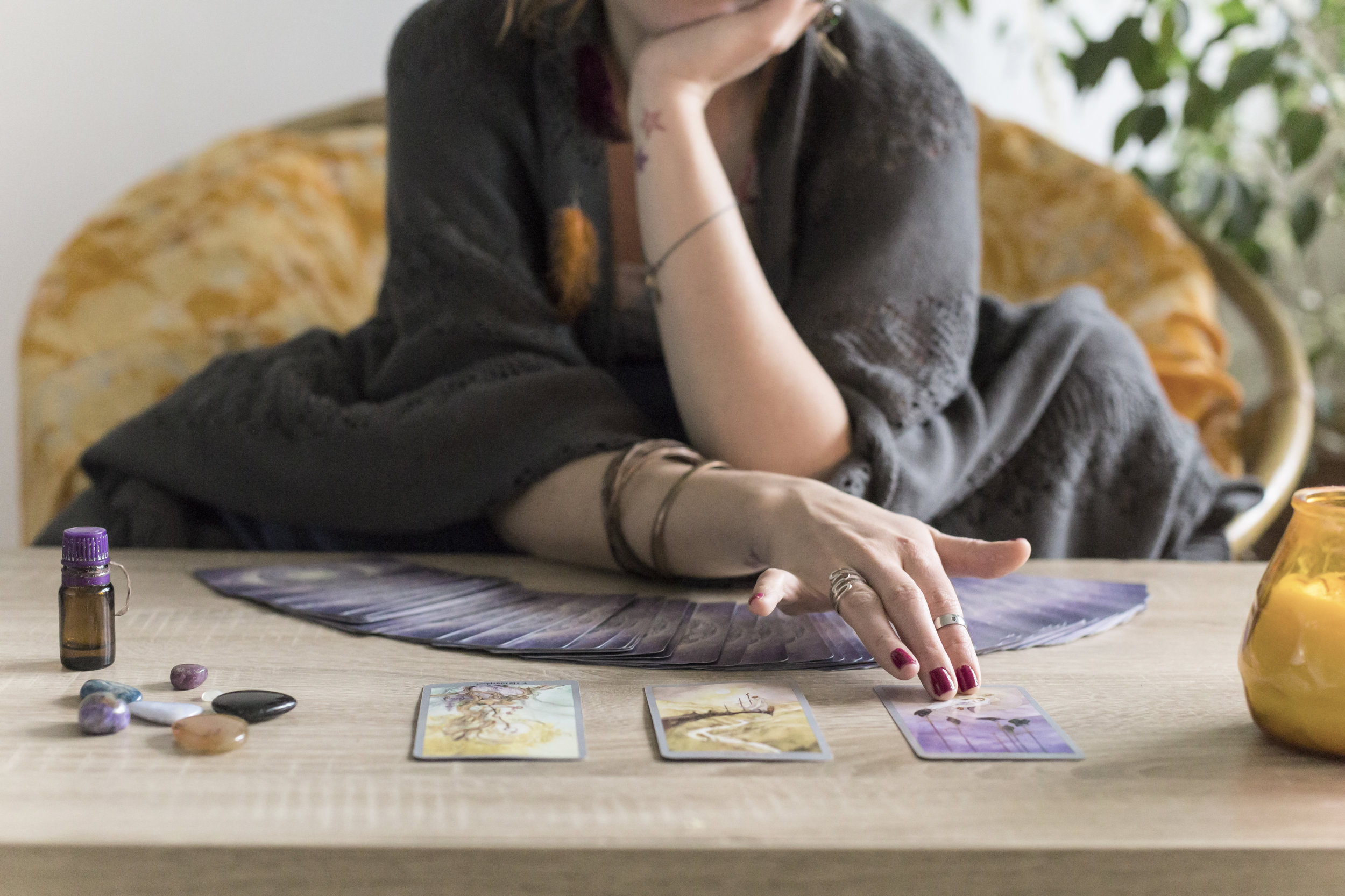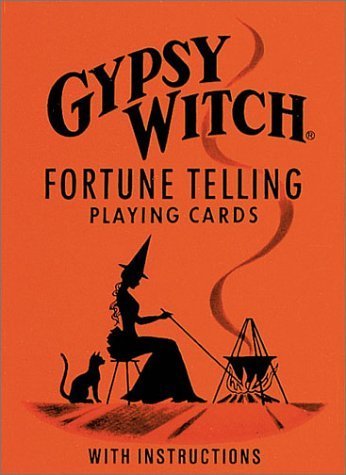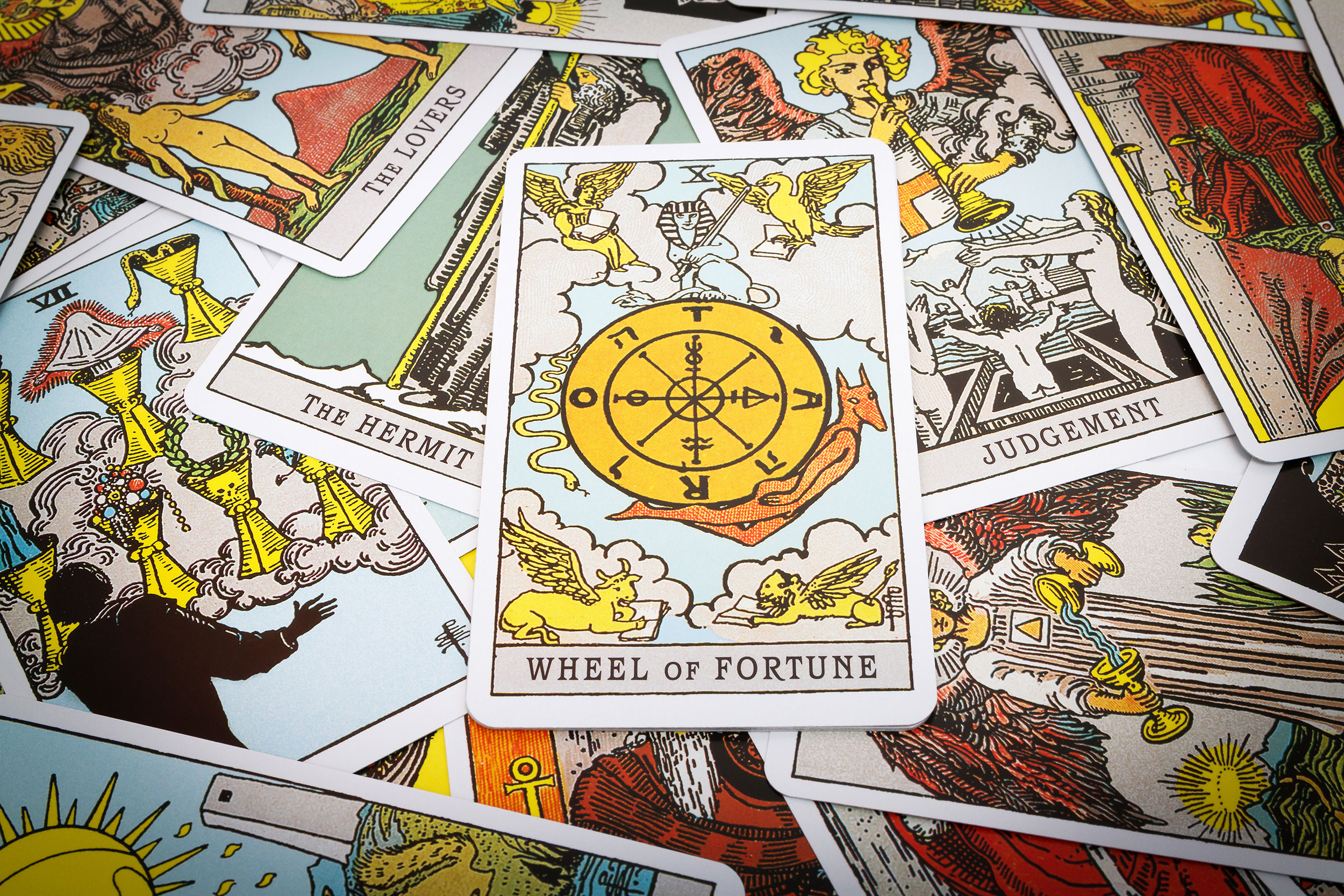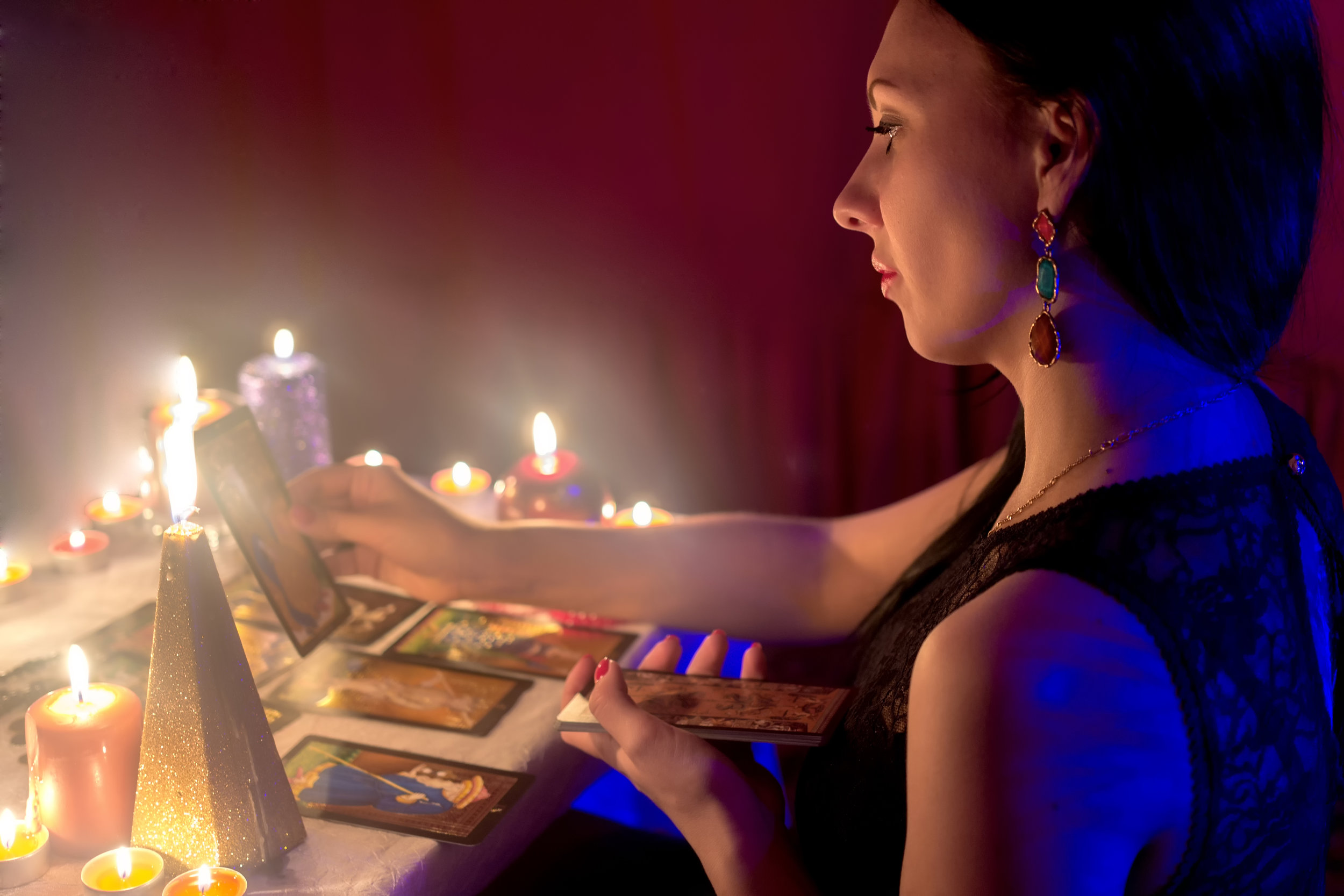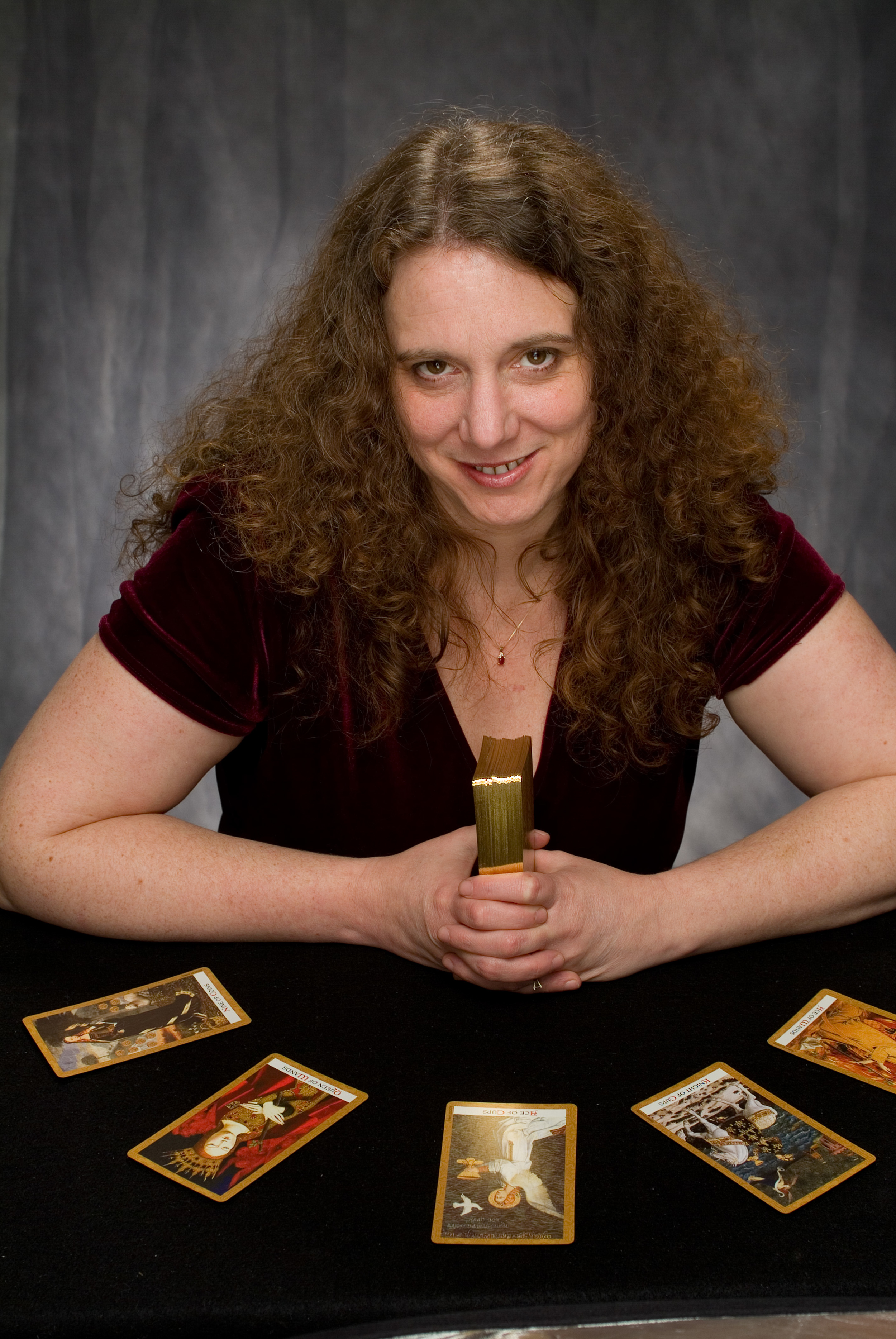
Welcome to my personal blog.
Here you will find my musings, thoughts and observations, all inspired by my experiences as a full-time professional tarot reader.
Unexpected Cards – The Magical Processes of Divination
Divination is most powerful when accompanied by contemplation.
Unexpected Cards
The Magical Processes of Divination
Tarot, and cartomancy in general, is enjoying worldwide popularity right now. Some folks think this is a measure of the high level of uncertainty and despair in the world, coupled with the low level of available mental health services. There is a lot of speculation as to whether practices like tarot offer true mental health benefits or actually make things worse. I have seen evidence for both.
A great tarot reading, or a meaningful tarot practice, can bring understanding, balance, hope and healing in any situation, but only if the cards’ messages are interpreted in a way that gives the seeker some responsibility for their own contemplation, healing and actions. Those who come to the cards only to hear a pretty story of their future fortune are often disappointed by the reality of what tarot offers best; the opportunity to take a hard look at oneself.
That tarot is trending right now offers us a level of accessibility and acceptability we have never enjoyed before. The downside is how easily esoteric traditions can become muddied as more swimmers enter the water. I’m sure every generation of tarotists has felt concern that their tradition was being misunderstood or watered down. Yet, tarot has survived the past few hundred years more-or-less intact. I am sure there will always be traditionalists who preserve the ancient truths, and iconoclasts who try to expand those truths in new ways.
The best thing about the tarot explosion is the number of people trying formal divination for the first time.
Chances are we were all exposed to some kind of divination as children; twisting apple stems or bouncing seeds on our hands to reveal the initial of our future spouse. In elementary school, we folded paper to make “fortune-tellers” that fit over our fingers and proffered the hilarious fortunes we made up, whispering together during recess. When a piece of silverware was dropped on the floor during dinner preparation my aunt interpreted it as a predictor of an unexpected dinner guest.
When you think back, do you remember divination games in your family, or on the playground?
When did formal divination first enter your life?
My first official cartomancy was with the Gypsy Witch Fortune Telling Card Game, when I was eight. I remember how clearly the cards spoke, and how uncannily true my first reading felt. I had the same feeling more than a decade later when I first started playing with I Ching. Yet, I resisted tarot.
I think the reason I resisted tarot, even while embracing I Ching, is that I had seen so many people take tarot so literally, so fundamentally. I scoffed at people who would believe something they thought a piece of cardboard told them over obvious logic.
At that point I had yet to understand just how logical tarot could be.
Today I am a fulltime professional diviner with a twenty-five-year career behind me. I hope I am lucky enough to have another twenty-five years of professional tarot in front of me.
As I contemplate the magic of divination and the many ways I have witnessed it in my life and work, I come to a few conclusions.
First, although tarot is not the only awesome tool of divination available, it is by far my favorite. It is my favorite because of its art, structure, archetypes and history, as well as the way it finds its way into popular culture in every generation.
Tarot functions as a book of spiritual wisdom as well as a fortune-telling device. Each tarot card teaches us a spiritual truth which we can access in study and meditation, as well as in divination.
When we consider how poignant and helpful divination can be, we have to consider two sticky questions.
First, how in the world does divination work?
Second, how can it be that once in a while divination seems to reveal wrong answers- either describing a current situation differently that we see it, or predicting an outcome that doesn’t come to pass? And, if the answers seem to us to be occasionally wrong, why do we believe divination helpful?
I can’t begin to say what power drives divination. Some tarotists ascribe actual personality to their card decks. I definitely don’t do that, nor do a believe an entity, either angelic or demonic, determines which cards we see. Although,I do believe that Spirit can speak through the cards.
For me, the power of random token divination comes from the magical energy of random. The power of tarot in specific comes from the third eye, or brow chakra, which is the seat of eyesight, imagination and psychic ability. As we see the card image our imagination is inspired, and our psychic ability is engaged.
I fully admit, however, that my explanation of why and how things work is no more verifiable than anyone else’s explanation that might be more or less fanciful than my own.
Now, the bit about ‘wrong divination’.
We have an expression in tarot. “The cards never lie”. Yet, the cards can speak in so many ways that sometimes the reader can get it wrong.
When the cards come up to describe the past or the present, we might sometimes be surprised that the cards show up the way they do. We might be processing something that has happened, or is happening, in a particular way, and the cards that come up might show us something different.
We might look at those unexpected cards and say that they are ‘wrong’.
We all love the readings that happen when the cards come up and reflect exactly what we are thinking and the way we are feeling. Yet, if the cards come up differently than expected, there is real value in working to figure out why they are appearing as they are, and what message they have for us.
When we allow it, this process of introspection around unexpected cards can reframe our perspective, help us heal from the past and give us helpful information about where we are.
Unexpected cards that describe the past or present should not diminish the reading or cause us to reject the wisdom of the cards. Rather, those unexpected cards can become the focal point and lesson of the reading.
When we see cards that appear to predict the future, we can’t necessarily judge them against a backdrop of what is expected, because we aren’t there yet.
Of all divinatory operations, it is the prediction of the future that can be the most amazing, or disappointing. Ask any meteorologist or financial forecaster; predicting the future can be challenging for everyone!
Yet, it wasn’t our ability to predict the future that got most of us hooked on divination. What got me hooked, and what I believe got most of us hooked, was the way divination showed us our current situations, and helped us process our past.
When we use tarot to predict the future, we can always interpret the cards that appear as energies that will be available to us in the future, or things that we need to keep in mind going forward.
When tarot predictions are uncannily accurate, as they often are, we might start to believe that every single thing we think we see in the cards will come to pass.
Divination is probably most helpful when we keep an open mind and use that open mind to contemplate the messages and advices we have received.
Contemplation, as opposed to blindly receiving information without question or process, is also part of the magic of divination.
A good professional reading will help you contemplate what is going on in your life and will guide you to consider what is most important. When you read for yourself, your divination process will be most effective if you take the time to puzzle out the cards you receive, rather than quickly accepting or dismissing them as right or wrong. From my perspective, every card we receive in a reading is the right card. We just need to figure out the way in which it is right.
Musings on the Wheel of Fortune
Some thoughts on the Wheel of Fortune.
Something I love about tarot is that any of the seventy-eight cards can provide hours of entertainment and inspiration when we choose to ruminate upon it, research it, observe it closely and meditate on it.
Recently I’ve been fascinated with Major Arcana 10, the Wheel of Fortune.
One of the things I first considered is that the term, “Wheel of Fortune” exists beyond tarot. Was the title of the famous game show inspired by tarot, or is there an older reference to which both Vanna White and tarot owe gratitude?
It seems the concept of a universal wheel originated in Babylon and was developed by the ancient Greeks. The concept of the “Wheel of Fortune” was patterned after the zodiac. It’s interesting to note that ancient Indian art includes a thematically similar “Wheel of Becoming”.
In the medieval philosophy that birthed tarot the Wheel of Fortune (or Rota Fortunae) belongs to the Goddess Fortuna (Tyche) who spins the wheel randomly, causing fortunes to be won and lost.
In the Waite-Smith depiction, we see the words “tarot” and “rota” made of the same letters within the wheel. The Four Evangelists grace the four corners, as they do in the World card. Here, however, they are actively writing their gospels.
My favorite depiction of the Wheel of Fortune is from World Spirit Tarot, where humanity is bound to the wheel turned by the Gods.
While the age of the combustion engine has conflated wheels with transportation and forward motion, there continues to be a spiritual sense of the symbol of the wheel in popular culture. When I think of tarot’s Wheel of Fortune, I often think of two songs; Spinning Wheel by Blood, Sweat and Tears, and The Wheel, by the Grateful Dead.
There is a certain quality in tarot cards that causes them to behave in a reading much like their classic meaning. The very nature of the Wheel of Fortune is uncertainty and lack of control. Sometimes the message of this card is that anything can happen. In a reading, very often there is a sense that the Wheel of Fortune, due to its capricious nature, could mean anything at all.
When I lived and worked near large casinos, the Wheel of Fortune very often meant visiting the casino, working at the casino, or even developing a gambling addiction.
Recently, I have seen the Wheel of Fortune appear to discuss repetitive cycles, especially in habits and relationships. The Wheel of Fortune can describe the on-again, off-again cycle of a couple who keeps breaking up and getting back together. The Wheel of Fortune can describe the cycle of an addict who keeps getting clean but then falling off the wagon. I have seen the Wheel of Fortune appear for those struggling with bipolar disorder.
At the same time, when well-dignified I often see the Wheel of Fortune as a go-ahead from the Universe to take a risk and know that luck will be with you.
Sometimes I see the Wheel of Fortune as a reminder that no one is better off or worse off than anyone else; we all have our ups and downs.
Once, on the Upper East Side of Manhattan, the Wheel of Fortune appeared to me as I stared at a round church stained glass window, grappling with my mother’s terminal cancer as she was being treated at Memorial Sloan Kettering. Its message was a clear comfort; this is part of life, it’s not your fault, it’s the circle of life (cue Elton John and the lions).
When we contemplate a tarot card deeply, we reveal new avenues for interpretation. My deep contemplation of the Wheel of Fortune has led me to take my time with this card when it appears in a reading. As card Ten it carries the energy of One, offering new opportunities and beginnings, and cautions against repetitive cycles. The Wheel of Fortune is associated with Jupiter, which deals with both luck and law, but tends toward tolerance and expansion.
When the Wheel of Fortune predicts the future, you might interpret it as anything can happen, or that nature will take its course. At the same time, it can comfort you with the knowledge that, even in dark times, luck is on your side.
Further Reading
Community blog
Personal Blog
Tarot Reading Technique: Turn Problem Questions into Profound Readings
Amongst tarotists of every level of experience, from beginner to pro, is an ongoing discussion about the questions we pose of tarot.
There are workshops, blogposts and memes designed to help us understand how to phrase a helpful question, and, in some cases to didactically tell us what tarot can and cannot do, or what we should or should not ask tarot.
Amongst tarotists of every level of experience, from beginner to pro, is an ongoing discussion about the questions we pose of tarot.
There are workshops, blogposts and memes designed to help us understand how to phrase a helpful question, and, in some cases to didactically tell us what tarot can and cannot do, or what we should or should not ask tarot.
I rail against the can’ts and shouldn’ts. My philosophy is this. If you want to ask a question, ask it. If the cards respond in a way that makes sense, great. If they don’t, then it is time to rephrase your question and dig deeper into your divination process.
Here’s a sort of question that could be quintessentially problematic to answer, but also could be a goldmine for profound divination if dug into properly.
Will I ever find my true career path?
If asked such a question, there would be nothing wrong with pulling a card or two to see what comes up. However, in the eight small words that comprise that question there are many significant questions that could lead to a life-changing reading rather than a simple career prediction.
Let’s break it down.
The first point I will make is the most obvious. Most readers will tell you that the better question would be "What must I do in order to find my true career path?"
Rather than asking simply for assurances for the future, this question asks for ways to be proactive toward reaching one’s goal.
The second problem with this question is an over-arching spiritual belief/assumption that there is indeed a "true career path" for the questioner.
Whenever a divinatory question isn’t about something specifically spiritual but relies on a specific spiritual belief, I prefer to rephrase the question. In this case the question I would start with would be:
"Is there a spiritually pre-ordained career path for this individual?"
If the reading proved positive, I might then ask questions like "What is it?" or "How can she find it"?
If the reading suggests that this person doesn’t have a pre-ordained career path, the way is clear to do some great career vision work with tarot. By looking at the querent’s skills, desires, likes, dislikes, drive and opportunities you should be able to come up with an action plan for developing a fulfilling career.
In this were the case, the belief that the Universe had some sort of special career plan for the querent may have kept her from seeking her path herself.
I think we need to be super careful about questions that hold within them inherent assumptions. The assumption in this example was spiritual. There can be mundane assumptions as well. Imagine the question, "Why doesn’t my boss like me?" It would be wise to first ask the cards how the boss feels. Clearly, a reading based on a false assumption can’t be of much value.
Something a question like "Will I ever find my true career path?" screams without saying a word is frustration. The difference between asking "Will I?" and "Will I ever?" is energetically enormous. When frustration is so clearly evidenced, it makes sense to ask about what has created this frustration.
This question offers an opportunity to pull cards about the current career, the career history, and what has caused the frustration. This can give advice for healing from past career trauma, handling a currently difficult job and finding a career change that feels like a calling.
Of course, these sorts of questions aren’t always about career. We voice our frustrations with our families (Will my mother ever listen to me?) about love (Will I ever meet a nice man?) and about ourselves (Will I ever get control of my weight?). Voiced frustrations unintentionally offer a wonderful opportunity for healing through divination.
Whether we are reading for ourselves, our friends or our clients, the questions we ask, and the questions we are asked, can offer a much deeper reading than expected. We need to be willing to be proactive rather than passive by asking "how" rather than "will". We need to question every assumption. We need to hear the frustration in our own questions, and in the questions of others, and form more questions that offer healing, strategy and understanding in the face of those frustrations.
Five Ways to Keep Your Tarot Readings Fresh
Use these techniques to assure each reading you give is insightful and exciting!
If you are a tarot reader, either hobbyist or professional, you surely know the exhilarating feeling of the reading that flows like a well-crafted story and cuts to the truth like a knife through butter.
You also probably know the drudgery of slogging through a reading that feels as inspiring as white rice.
When we readers contemplate the factors that create those epic readings, versus the readings we yawn through, we often credit (or blame) the client, or the deck, for the energy of the reading.
It’s true that some clients are easier reads than others. It’s also true that each reader tends to connect with certain decks more than others. However, I think it is safe to say that the responsibility for the energy of a reading lies not with the client nor with the cards, but solely with the reader.
The questions are, how can we control the energy of each and every reading? What can we do to make sure that each reading is not only accurate, but also inspirational? How can we stay engaged and interested in each person’s story?
These questions are particularly important to professional readers who perform multiple readings a day, psychic entertainers who work the cattle call at corporate events, and tarot aficionados who want to make sure they can read for all of their friends at the kiki. The truth is, although each tarot reading is as individual as a snowflake, each tarot reading is drawn from the same seventy-eight cards. And, although each tarot client is a unique individual, the commonality of human experience and the predictability of human psychology can cause us to feel that we are giving the same tired reading over and over again.
Professional readers who work with groups often receive that terrible review. “She said the same things to all of us.” Or, “We all got the same reading!” Typically, when I hear this complaint about colleagues, I recognize that the group of complainers really do have a lot in common, and those commonalities would be the logical talking points in each reading.
Nonetheless, a great reader must be able to reveal the truly unique aspects of each person for whom they read, even if their clients are a family of identical triplets.
Have you given readings that felt a little stale? Here are five things you can do to make sure each reading you perform feels fresh.
1. Use key words and memorized card meanings as a jumping-off point for your interpretations.
Key words and classic meanings can INFORM a reading, but cannot BE the reading. Use intuition and context to speak to the client’s individual situation rather than making a blanket statement based solely on what you have memorized about the cards that appear.
We all develop particular ways of understanding each card. We may have pet names for specific cards, or archetypes that resonate for us. It’s important to keep our personal relationships with the cards personal. Our internal understandings of the cards may be helpful fort teaching tarot students, and in our own contemplation. But, if we fall into the trap of always saying the same thing every time we see a particular card, we are no better than a tarot app, offering the same flat reading every time a card is revealed!
2. Be aware of your energy, and consciously control the energy at the table.
A tarot reader must be an energy worker. Don’t just flip cards and interpret! Make sure you conduct your readings in sacred space, and that you are constantly aware of the flow of energy in the room. Use your breath and your focus to keep the energy moving. This will ensure that the reading is a spiritual and enlightening experience.
3. Read books, watch movies and have conversations.
Tarot reading is a communication skill. The more you expose yourself to new vocabulary and new communication styles, the more you will naturally incorporate new words and phrases into your readings, avoiding the rut of saying the same things over and over.
4. Don’t rely solely on questions from the client; ask questions of the cards that will take the reading as far as it can go.
Your client may not have questions that will lead to an interesting reading or may not know what questions will be most helpful to ask. Let the cards that appear create curiosity in you that leads you to ask expansive and meaningful questions. Be willing to rephrase your clients’ questions, or to break a single question into multiple questions.
5. Use the right spread and/or reading technique for the right situation.
Tarot spreads and reading techniques are not one-size-fits-all. A past-present-future three-card spread may not give enough information to answer a complex problem, while a Celtic Cross may be too broad to give specifics.
Changing up your spreads and techniques will keep you on your toes and keep your style fresh, while giving you the best opportunity to give each client the most information, and the best experience possible.
A great tarot reading needs to be a lot of things. It needs to be accurate, entertaining, insightful and enlightening. It’s often a plus if there is some humor involved. Maybe most importantly, each reading needs to be tailored to the needs, truth and energy of each client. When we make this our priority, we are open to the authentic mystical divination process. And, we are able to effectively communicate the information we receive in a way that this relatable, interesting, and not a bit boring!
Tarot, Decision-Making and Inner Guidance
Tarot, and a good tarot reader, can’t make decisions for anyone. Tarot can help discern our innermost desires, fears and motivations. Armed with that knowledge, we have an easier time tuning in to our inner guidance, and making the authentic choices that will create the future we desire.
So often people want a tarot reading to tell them what they are going to do in the future. While tarot can be amazingly predictive, we each have control over our future actions and decisions.
Rather than predicting what our future selves might do, tarot serves to help us find our core truths.
Tarot is an effective tool to help us when we’re struggling to find inner guidance and make the best decisions in life. The stakes are high; no one wants to choose something they will live to regret.
Often, we have a hard time finding our inner guidance. Many times, the well-intentioned advice and not-so-well-intentioned judgements of others are part of the problem.
We often make the decisions we believe we should make, rather than the ones that will really make us happy. We fear ridicule, judgement, and lack of faith from others. We forget that, usually, those things are rooted in fear and jealousy, rather than in a lack of belief in our abilities.
Nonetheless, we often give the advice of others more weight than we do our own inner knowing, or our own genuine happiness. Sometimes, that is because it’s hard to know the difference between anxiety and intuition, and between good advice and judgement based in fear.
Whether we chose to consult the cards for ourselves, or to work with a competent reader, a session with the cards can help us sort out truth from fear.
Tarot, and a good tarot reader, can’t make decisions for anyone. Tarot can help discern our innermost desires, fears and motivations. Armed with that knowledge, we have an easier time tuning in to our inner guidance, and making the authentic choices that will create the future we desire.
